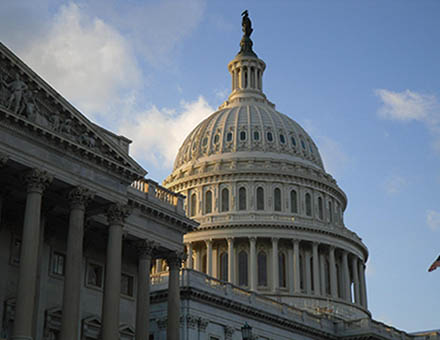SAM Magazine—Washington, D.C., Aug. 16, 2022—President Biden signed the $750 billion Inflation Reduction Act today.  The package includes the largest climate, energy, and environmental justice investment ($370 billion) in U.S. history, from which the U.S. ski industry stands to benefit.
The package includes the largest climate, energy, and environmental justice investment ($370 billion) in U.S. history, from which the U.S. ski industry stands to benefit.
The legislation, which addresses health care and taxes in addition to climate, will boost production of green energy, lower the cost of clean transportation and energy, and invest billions in sustainable forestry, wildfire risk reduction, and drought response, among other provisions—all of which will be helpful to the entire ski industry long-term.
According to National Ski Areas Association (NSAA) director of public policy Geraldine Link, “Over time, the IRA is expected to lower energy expenditures for households, businesses, and industry by 4 percent by 2030 and result in a savings of almost $50 billion per year.”
Bonnie Hickey, the sustainability director at Bridger Bowl, Mont., who has been an advocate for the legislation with Montana’s democratic senator, Jon Tester, notes several positive potential outcomes from the bill. In Montana, with its burgeoning clean power industry, she believes that the investment in renewable energy will create in-state jobs, bolstering the local economy. “Anything that is good for Montana’s economy is good for the ski area,” she said.
“The momentum that the bill generates could make it easier (and more economical) for people to make more greener building and energy choices,” Hickey added.
Bridger Bowl also stands to benefit from investments in wildfire risk reduction and water security. The ski area had wildfire approach within a few miles last year, and much of the West and the Plains have suffered from ongoing drought. “With these fires and the dwindling of water resources, we need legislation like this in order to survive,” she said.
Hickey is not alone in her advocacy for the legislation. Many resorts and industry partners have expressed vocal support for the bill, and many more have been working behind the scenes on its passage.
“Through signing on to coalition letters to Congress, direct correspondence with members of Congress, both Zoom and live meetings, op-eds, and social media posts, resorts and ski associations have made an impact,” said Link.
The West Virginia Ski Areas Association (WVSAA), for example, was in communication with Sen. Joe Manchin—an architect of the bill and key vote to secure its passage—in support of the legislation in conjunction with Link at NSAA. “[The bill] is a positive step forward for all of the ski areas in West Virginia,” said WVSAA executive director Joe Stevens.
Aspen Skiing Company, Vail Resorts, and Arapahoe Basin all tweeted out support for the bill as it was making its way through Congress last week as well, as did NSAA.
🎉🎉🎉 The Senate just passed the #InflationReductionAct, the most meaningful climate legislation in US history, cutting GHG emissions 40% by 2030 & signaling to the world that we’re serious about climate action! Thank you @SenatorSinema @Sen_JoeManchin @Hickenlooper @ChrisCoon
— Aspen Snowmass (@AspenSnowmass) August 7, 2022
Hickey suggested that ski area operators reach out in the aftermath of the bill’s passage to show support to their elected officials. “I think it is really important that legislators hear that positive support when they take the actions we are looking for,” she said. She encouraged ski area operators not to forget the power of their individual voices: “Your ski resort speaking to your state representatives about why [legislation] benefits your business and your state is important. The local stories appeal to legislators and catch their attention.”
It took 18 months of work for the Inflation Reduction Act to come to fruition. The bill has several concessions, notably it provisions for new off-shore oil drilling leases. However, “If it really can result in a 40 percent emission reduction (as anticipated), that’s impressive and will help put us back on track for achieving of our national carbon reduction goals,” said Hickey. “If we didn’t make this move forward, we wouldn’t be standing still on climate, we’d be moving backward.”




